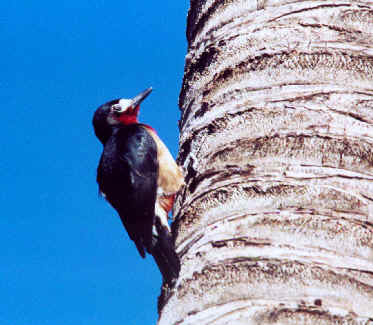 Puerto
Rico Birds
Puerto
Rico Birds during FONT Birding
& Nature Tours
1988 thru 2007
 Puerto
Rico Birds
Puerto
Rico Birds
during FONT Birding
& Nature Tours
1988
thru 2007
(during the months of January,
February,
March, April, May, July)
List compiled by Armas Hill
There have been 27 FONT birding
tours in Puerto Rico, during which 187 species of birds have cumulatively been found.
Codes:
(t): a globally threatened or rare species, designated by Birdlife International
(t1): critical
(t2): endangered
(t3): vulnerable
(nt): a near-threatened species globally
(p): seen only pelagically
(mi): on Mona Island
(PRe): endemic in Puerto Rico
(PR&VIe): endemic to Puerto Rico & the Virgin Islands
(PRr): rare in Puerto Rico
(i): introduced species (Puerto Rico has many; there are 19 in this list.)
Upcoming Puerto Rico Tour Itineraries
Caribbean
Bird Photo Gallery (in
PG)
Notes:
The tour in February '88 included a trip (by air) to uninhabited Mona Island, off the west coast of Puerto Rico, about mid-way between Puerto Rico and the Dominican Republic. Birds found only there noted by an (mi).
A few tours included a trip by ferry to Culebra Island, off northeastern Puerto Rico, about mid-way between Puerto Rico and the Virgin Islands.
During our Feb 6-11, '96 tour, we conducted our first Caribbean pelagic trip off the west coast of Puerto Rico. A Black-capped Petrel was seen. (Only 3 records in Raffaele's book: "Birds of Puerto Rico".) Also whales and dolphins. During the pelagic trip with our Feb 15-19 tour, about 300 boobies. Over 200 of them, Red-footed (both brown & white morphs). Also a 60-foot Whale Shark by the boat. This 4-day tour, one day shorter than our norm. With the pelagic trip during the March '96 tour, 6 species of terns were seen.
12 of the very rare Puerto Rican Parrots were seen during FONT Puerto Rican tour #12, in March 1996. Subsequently, the species has become more difficult to see in the wild. 3 were seen during tour #18, in March 1998. The species was seen again during tour #22, in March 2000. One wild bird was seen during tour #26, in March 2004.
Although "A Guide to the Birds of Puerto Rico and the Virgin Islands", by Herbert A. Raffaele, indicates that there are no records for the Northern Rough-winged Swallow in Puerto Rico, the species was seen there during our March '98 tour in the eastern part of the island. The fore-mentioned book does say that it has been noted as a rare migrant in the Virgin Islands.